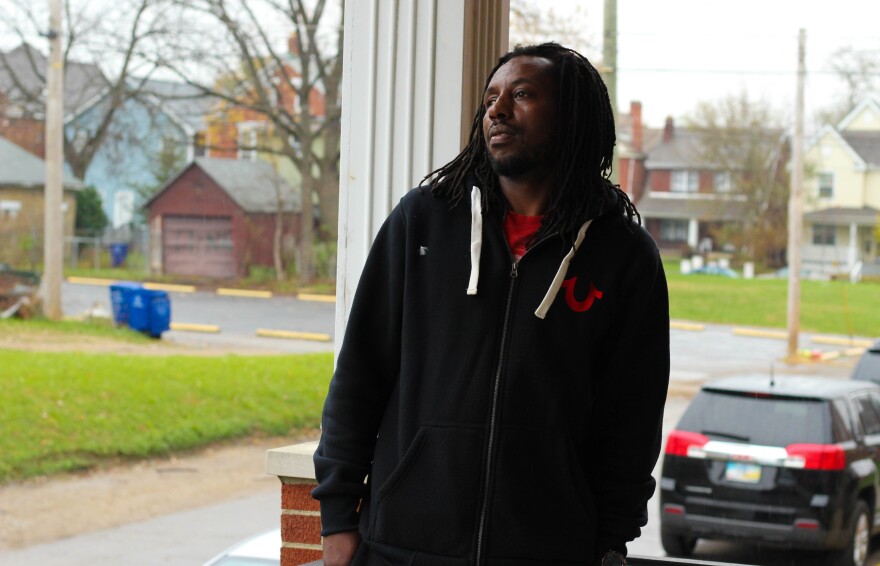Antonio Stargell says he still gets angry thinking about his son's death.
“He got shot day after Mother's Day, 2016, with some friends,” Stargell says.
But his son’s murder became another unsolved case as witnesses refused to step forward and Stargell became frustrated with the police investigation. He says he strongly considered finding his son's killer on his own to seek revenge.
“I got a whole bunch of other kids I gotta live for,” Stargell says. “I still want justice for my son, but then I can't get justice for the rest of my kids if I'm in jail.”
Columbus is seeing more stories like Stargell’s, especially this year: The city has already seen 114 homicides in 2017, nearly half of which are unsolved. Among those unsolved cases, half don’t even have a known suspect or motive.
Mayor Andrew Ginther's 2018 budget plan would spend $2 million for a series of new public safety initiatives, aimed at reducing gun violence and restoring community-police relations. Instead of traditional policing, these programs offer social services and violence intervention as a means of preventing crime in the city's more at risk neighborhoods.
Many grassroots organizations in the city already offer these services, and have done so for years. Now that the city government has caught on, they wonder how they'll be included in Ginther’s plans.

Stargell credits Ministries for Movement, an organization run by Pastor Fredrick LaMarr for helping him come to his senses. Located on Columbus’ South Side, LaMarr has been working to prevent these violent, and often deadly, retaliations for over a decade.
The group also puts people in touch with job training at the National Center for Urban Solutions, educational opportunities at the Academy for Urban Scholars, and offers a summer program for kids with Urban GEMS.
“And then we got after school, so every place that we can engage,” LaMarr says. “It's not a day that the doors of the church ain't open because it's a community church.”
When he heard about the Mayor's plan to invest in similar programing for Columbus neighborhoods, he was optimistic.
“What is the benefit for all of us, and that's to stop the violence,” LaMarr says.
Leaders from dozens of Columbus organizations met over the weekend to discuss how their violence prevention programs could fit with the city’s program.
“O.K., how do we help the Mayor accomplish what he's trying to accomplish?” LaMarr says.
Other organization leaders, like Dennis Muhammad, say that while Ginther is moving in the right direction, it would have been wise to invest in grassroots organizations who have already developed a rapport with communities.
“Politicians always come up with what they think the people want and them initiatives never work,” Muhammad says. “The people have to get more involved in the solving of their own social problems.”
Muhammad is the director and founder of The Peace Keepers, a national organization that has been active in Columbus for the last five years. The group of volunteers patrol Livingston Avenue and intervene in situations before they become violent.
He says many organizations like his have already been proven effective.
“You cannot ignore that and I think it's time for them to come and sit at our table,” Muhammad says. “And they should ask us, what can we do for y’all?”
In some areas, Columbus has acted on recommendations from residents. Tammy Fournier Alsaada of the People's Justice Project commends the mayor for taking what she calls a huge step forward: ending the Community Safety Initiative.
“That’s based on collective input from the community, from law enforcement, from neighborhood and community leaders," Ginther said in his announcement. "We think this is gonna have a far more powerful and impactful way to police in our community."
For years, the People’s Justice Project has demanded an end to the controversial program, in which Columbus Police target higher-crime areas with increased patrols and plain-clothed officers. It’s long been criticized for racial profiling and straining community-police relations.
“We definitely look at that as a win for the community,” Alsaada says.

Alsaada says now she wants to ensure that people who live in at-risk neighborhoods, and the grassroots organizations who serve them, will have the chance to give their input as these plans move forward.
“But what they're having to do often, and what the People's Justice Project continues to have to do, is force our way into the conversation,” she says.
In order to be successful, Alsaada says, the people on the ground have to buy into the mayor’s plan and support it.
In a statement, a spokesperson for the mayor said that Ginther met with many groups, including the People’s Justice Project and faith leaders and community leaders, and that work will continue as his Neighborhood Safety Strategy is implemented.




